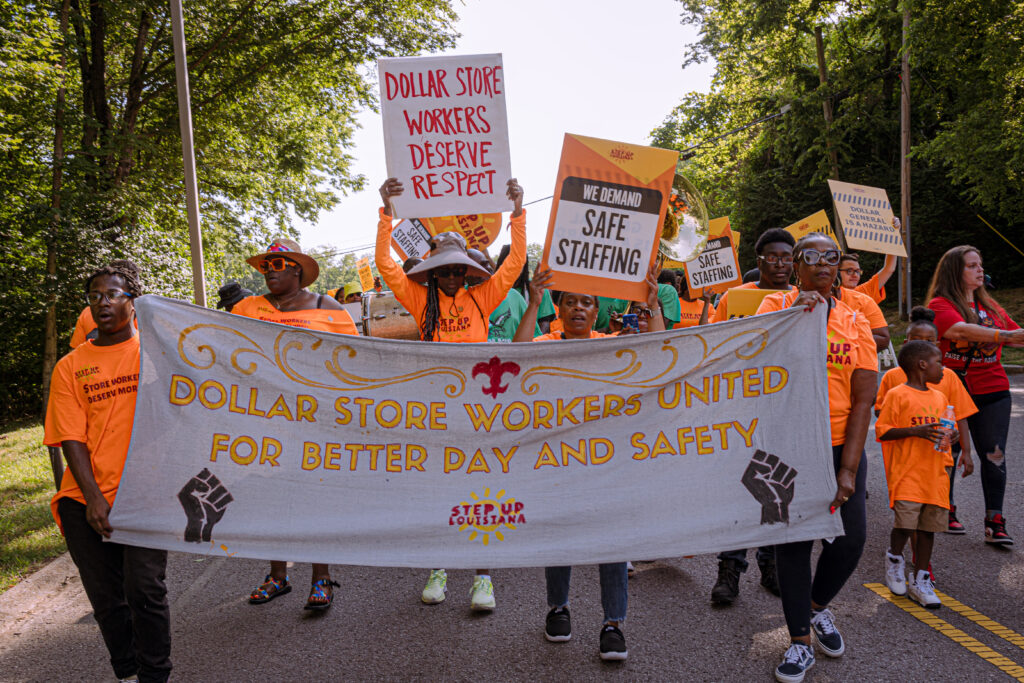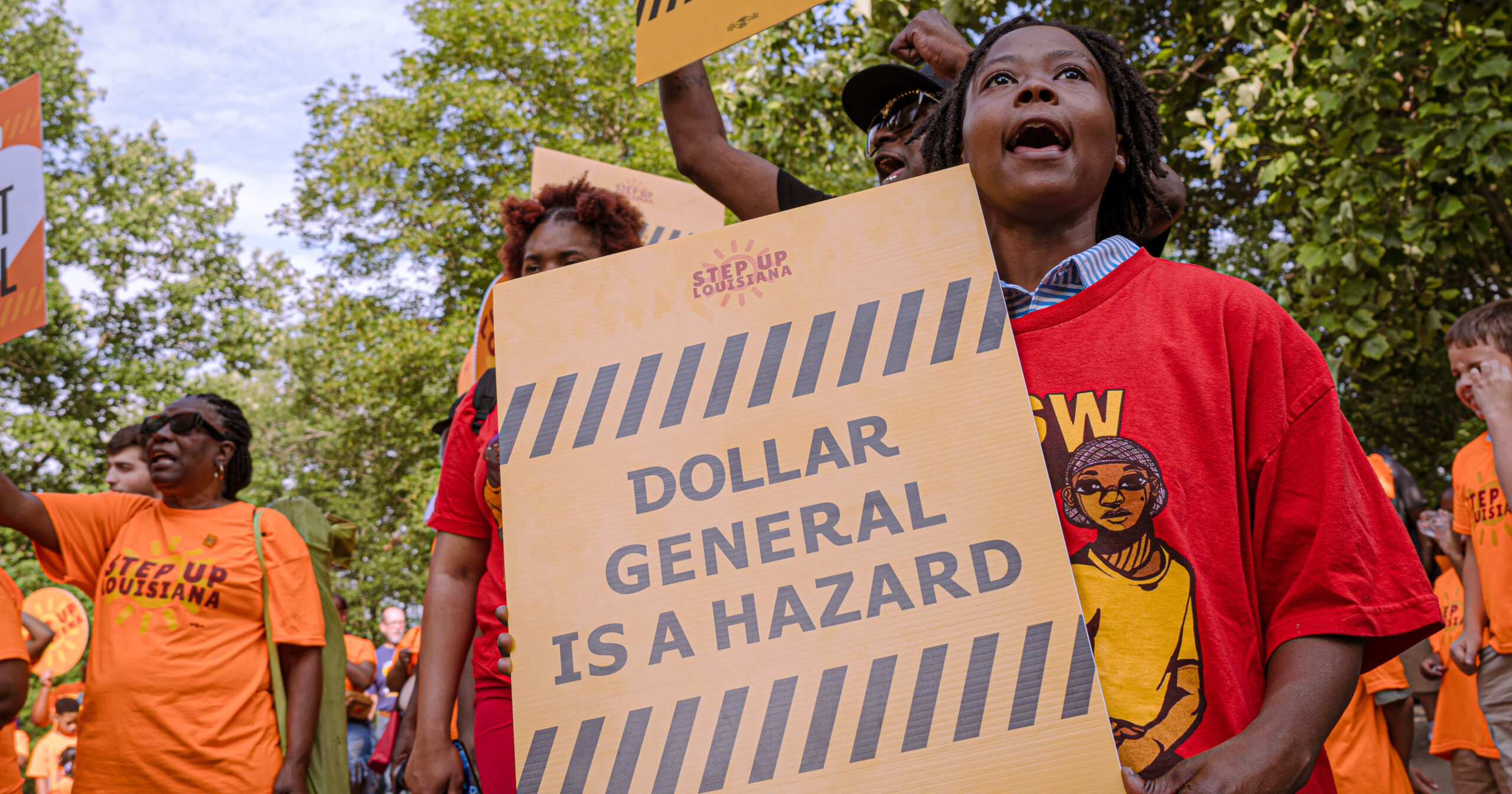Shareholders at Dollar General, America’s fastest-growing retailer, voted to require the company to independently audit the working conditions at its stores. The results come just one week after the Department of Labor levied a $3.4 million fine against the retailer for maintaining an unsafe workplace. “The company has expanded so fast and so recklessly,” said David Williams, an employee and member of advocacy group Step Up Louisiana who presented the proposal to shareholders, “that on any given day, I might have to deal with a rat infestation, a door they won’t lock or someone pointing a gun at me with no security to protect me.”
The audit, proposed by Domini Impact Investments, requires the Board of Directors to commission a third party to survey workers and evaluate how the company’s business practices impact employee “safety and well-being.” Once assessed, the board of directors must develop an action plan to address the problems.
Since 2017, the federal government has fined the Tennessee-based retailer more than $21 million for repeated health and safety violations. During that time, investigators at the Occupational Safety and Health Administration (OSHA) have repeatedly found emergency exits and fire extinguishers blocked by merchandise and unsafely stacked items.
In October, the company was added to OSHA’s “Severe Violator Enforcement Program” due to excessive workplace health and safety violations. “It’s a program for the worst safety violators in the nation,” Debbie Berkowitz, a former senior policy advisor at OSHA, told CNBC. Other program members include an Illinois-based manufacturer cited for 12 safety violations after a preventable workplace explosion killed four workers.

Just two months after the designation, six workers in North Dakota were exposed to toxic vapors, requiring medical care and an additional citation for not providing adequate training and protection from hazardous chemicals. “As one of the nation’s largest retailers,” OSHA’s Doug Parker said in a statement, “the company must focus its attention on resolving these issues and making corporate-wide changes to protect the safety and well-being of the people they employ.”
Dollar General’s Board, which includes a former McKinsey consultant and private equity leader, recommended shareholders vote against the resolution, citing it as “unnecessary.” “We use survey feedback,” they wrote in a statement, “to guide efforts to enhance the employee experience and find ways to ensure all employees feel heard, supported, and valued.”
To management, given the velocity they’re accumulating them, fines and lawsuits could just be a typical cost of business for the company. In Ohio, state law allows stores to have incorrect prices 2% of the time. The state of Ohio is now suing the company after an investigation found that Dollar General charged customers higher prices at the register than what’s displayed on shelves between 17% and 88% of the time.
The financial outlet Barrons found that this wasn’t an isolated incident. The company racked up over $1 million in fines across four states for similar charges. As newsworthy and damaging as the operational and safety penalties are, they’re still a rounding error compared to the company’s annual income. In 2022 the company posted $2.4 billion in profit.
Since the great recession, dollar stores have taken over much of the American retail world. An industry group that tracks retail openings estimates that nearly 43% of all newly opened retail locations are dollar stores. Dollar General has been the most aggressive actor. SEC filings say the company has added 1,852 stores since the start of 2020—or about 12 stores a week after accounting for closures.
The Dollar Store business model is pretty simple. It goes something like this. Companies locate stores in rural and low-income areas where there aren’t many options and rent is cheap. Management further lowers expenses by cutting labor costs by offering both low-pay and understaffing stores. They boost revenue by offering low absolute prices but charge more per unit. Since there are limited shopping and employment options, consumers and workers have very little recourse for either.
The arrangement has been incredibly lucrative for the company and its shareholders. Despite selling $185 billion less merchandise annually than Albertsons and Kroger, Dollar General is now worth about as much as the two companies combined.
However, the approach isn’t without its business drawbacks.
“State officials, customer complaints, and current and former Dollar General employees,” Barrons wrote in their investigation, “link troubles with pricing discrepancies to insufficient staffing.” Today’s results show that although Dollar General’s management wasn’t swayed, shareholders were.
The successful vote came after years of sustained lobbying and protest by workers and activist groups. Community organizations like Black Nashville Assembly, Central Labor Council of Nashville and Middle Tennessee, Interfaith Center on Corporate Responsibility, Step-up Louisiana, Tennessee for All, Union of Southern Service Workers, and United for Respect joined forces with the Tennessee AFL-CIO and SEUI Local 05 to rally and press shareholders.
Shareholder meetings are only available for shareholders or their legal representatives. Last year the company refused to seat three activists who were legally designated representatives, claiming they were four minutes late to the proceedings.
This year, Williams spoke, and investors listened.
Meanwhile, workers and labor activists from the nine organizations rallied outside.



